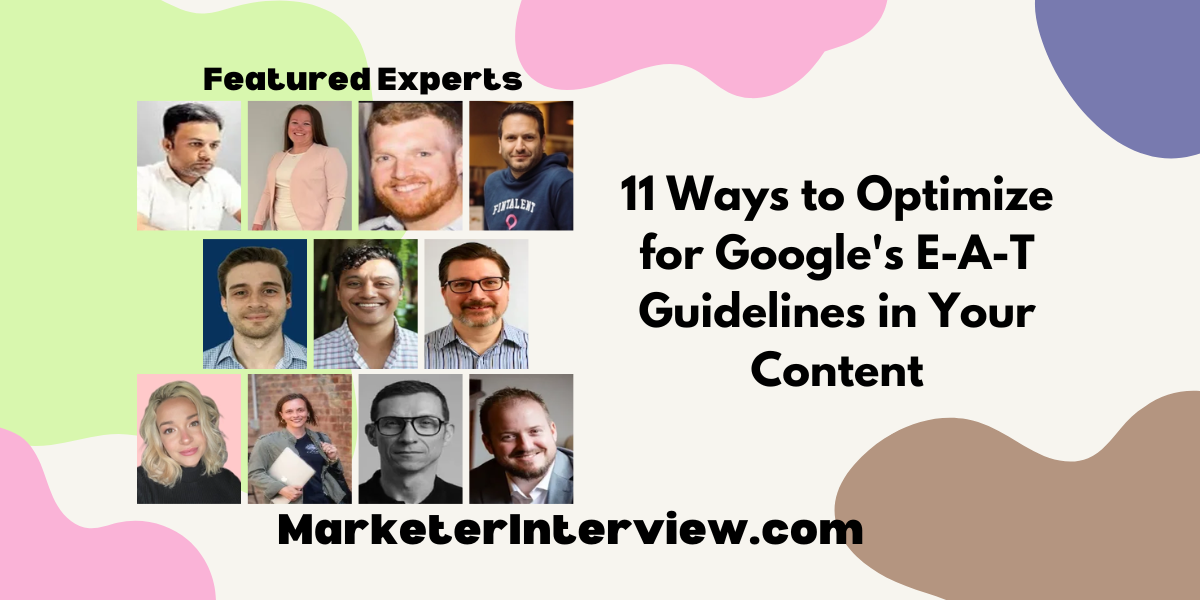11 Ways to Optimize for Google’s E-A-T Guidelines in Your Content
In the evolving landscape of SEO, adhering to Google’s E-A-T (Expertise, Authoritativeness, and Trustworthiness) guidelines is crucial. We’ve gathered eleven specific tips from SEO professionals and content creators, including content strategists and SEO analysts. From interviewing industry experts to creating educational content ranges, discover how to enhance your content’s E-A-T profile.
Want to get quoted in MarketerInterview.com content just like this? Apply to become a contributor today!
Contents
- 1 Interview and Quote Industry Experts
- 2 Showcase Rigorous Editorial Processes
- 3 Personalize Content With Case Studies
- 4 Detail Author Bios for Credibility
- 5 Collaborate for Expert Advice
- 6 Cite Authoritative Sources
- 7 Incorporate First-Hand Experience
- 8 Feature Authentic Expert Backgrounds
- 9 Regularly Update Content
- 10 Incorporate Expert-Authored Content
- 11 Create Educational Content Ranges
Interview and Quote Industry Experts
Regularly interview the experts in your company (or the people you want to present as experts) and publish content quoting them. Have those experts write content (or, more likely, have content ghostwritten for them) that showcases their expertise, and publish it on your own site and socials. Try to get some expert content published in their names on websites that are germane to your industry. Don’t just publish generic stuff, either. Publish knowledge and opinions that can only come from years of experience.

Rob Swystun, Content Strategist, Rob Swystun Content Marketing & Ghostwriting Inc.
Showcase Rigorous Editorial Processes
I believe one of the most underrated aspects of optimizing for Google’s E-A-T guidelines is implementing a robust editorial process.
While we focus on author expertise and content comprehensiveness when creating content for our clients and our own website, we never overlook the importance of showcasing our meticulous editorial processes. At Direction.com, we’ve witnessed the significant impact a rigorous editorial process can have on a website’s E-A-T standing.
For all published content, we advise:
- Thoroughly fact-check all information before publishing.
- Put content through multiple layers of editorial review.
- Clearly date articles and provide “Last Updated” timestamps.
- Swiftly correct any errors identified post-publishing.
- Consistently cite authoritative sources.
By emphasizing these quality control measures, we demonstrate to Google and our audience that all content we produce is trustworthy, reliable, and thoroughly vetted. This is particularly vital for YMYL (Your Money or Your Life) topics, such as health, finance, and legal advice, where inaccurate information could have serious consequences for users. A transparent, stringent editorial process is the unsung hero that elevates content’s E-A-T.

Madison Kirksey, SEO Analyst, Direction.com
Personalize Content With Case Studies
To optimize for Google’s E-A-T, I believe that personalized content is key. Include case studies, specific customer experiences, key problems that you solved based on your knowledge, and reviews from customers in your blogs and web content. Personalizing content will help you stand out from competitors, position you as the expert, improve trust with your audience, and create share- and click-worthy content. This consistent sharing of personalized, valuable content will help improve authority and trustworthiness over time. Using AI-created content to set the framework of your content is okay, but edit and personalize to make it the very best!

Beth Gillem, SEO Specialist, Dogwood Media Solutions
Detail Author Bios for Credibility
One effective way to optimize for Google’s E-A-T (Expertise, Authoritativeness, Trustworthiness) guidelines is to use detailed author bios. While high-quality content is important, Google also values the credibility of the authors. Clearly state the author’s qualifications and experience related to the content topic. This helps establish their expertise and builds trust with readers and search engines.
In addition to qualifications, highlight the author’s credibility through social proof. Include links to their social media profiles, publications on other reputable sites, or any industry awards they’ve won. This shows their authority in the field. Also, provide links to the author’s email or social media profiles, ensuring they are professional. This transparency not only boosts your content’s E-A-T but also builds trust with your audience. By highlighting your authors’ credentials and social proof, you enhance the overall credibility of your content.

Shane McEvoy, MD, Flycast Media
Collaborate for Expert Advice
Build relationships with other experts in your industry and ask them to provide helpful advice within your article. This builds trust with the reader while also boosting the authoritativeness of the article.

Rob Clegg, Senior Content Manager, Exclaimer
Cite Authoritative Sources
When crafting content, focus on building trust by citing authoritative sources. Link out to relevant academic papers, government publications, or established news outlets to back up your claims. This shows you’ve done your research and didn’t just pull information out of thin air. Google sees these citations as indicators that your content is credible and trustworthy, boosting your overall E-A-T.

Fahad Khan, Digital Marketing Manager, Ubuy India
Incorporate First-Hand Experience
These days, Google has expanded its guidelines to be E-E-A-T, adding “experience” to the classic expertise, authority, and trustworthiness. While experience and expertise might seem similar, the important difference is that Google highly values actual, first-hand experience of whatever content you’re writing. The more you can weave in your own first-person details, the more Google will value and reward your content. Speak from a personal level as much as you can to further bolster your content, make it unique, and showcase your overall expertise and authority on a topic.

Lora Shaw, Vice President of Operations, Pet Palace
Feature Authentic Expert Backgrounds
It’s absolutely essential to build authentic backgrounds for your experts in order to check the experience, expertise, and authoritativeness boxes. Our approach to this is to feature content generated by our actual moving teams and/or our satisfied customers. This kind of content doesn’t just play well with Google’s algorithm; it’s also the kind of information customers are looking for in order to choose a trustworthy moving company.

Nick Valentino, VP of Market Operations, Bellhop
Regularly Update Content
To optimize for Google’s E-A-T guidelines, we regularly update our content to ensure it reflects the latest trends and insights in the M&A industry. By revisiting and revising older posts, we provide readers with the most accurate and current advice. This practice maintains our authority and trustworthiness, boosting our credibility with both Google and our audience.
Additionally, incorporating expert opinions and citing reputable sources further enhances the quality and reliability of our content, solidifying our platform as a trusted resource.

Omër Güven, Co-Founder & CEO, Fintalent
Incorporate Expert-Authored Content
One specific tip for optimizing your content to meet Google’s E-A-T (Expertise, Authoritativeness, and Trustworthiness) guidelines is to consistently incorporate expert-authored content with clear author credentials. This approach not only enhances the perceived expertise and authority of your content but also builds trust with both your audience and search engines.
First, ensure that your content is created or reviewed by individuals who are recognized experts in the relevant field. Include detailed author bios that highlight their qualifications, experience, and any relevant accolades. For example, if you’re running a health and wellness blog, having articles written or reviewed by certified medical professionals can significantly boost your content’s credibility. This practice signals to Google that your content is produced by knowledgeable and trustworthy sources.
Next, build authoritativeness by obtaining backlinks from reputable websites within your industry. This can be achieved through guest posting, collaborations, or being featured in industry publications. High-quality backlinks act as endorsements from other authoritative sites, reinforcing the value and reliability of your content. Additionally, actively engaging with industry forums, contributing to discussions, and sharing insights on social media can further establish your brand and authors as thought leaders.
To enhance trustworthiness, maintain transparency and accuracy in your content. Cite credible sources and provide references for any data, statistics, or claims made. Regularly update your content to ensure it remains current and relevant, addressing any changes or new developments in the field. Moreover, include clear contact information, a privacy policy, and customer testimonials on your website to foster trust with your audience.

Richard Dalder, Business Development Manager, Tradervue
Create Educational Content Ranges
We’ve found great success by creating a range of educational content, from beginner guides to advanced how-to articles and videos. This approach really helps in demonstrating our deep knowledge and commitment to making our industry more accessible and understandable for everyone. It’s a fantastic way for us to connect with our audience and establish our brand as a trusted resource. This strategy not only enriches our users’ experience but also significantly boosts our credibility and expertise in the eyes of Google.

Amar Ghose, CEO, ZenMaid
Want to get quoted in MarketerInterview.com content just like this? Apply to become a contributor today!






